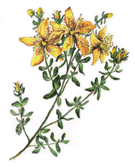
St John's Wort
Introduction
This fact sheet provides basic information about the herb plant or part of a plant used for its flavor, scent, or potential therapeutic properties. Includes flowers, leaves, bark, fruit, seeds, stems, and roots. St. John's wort-common names, uses, potential side effects, and resources for more information. St. John's wort is a plant with yellow flowers whose medicinal uses were first recorded in ancient Greece. The name St. John's wort apparently refers to John the Baptist, as the plant blooms around the time of the feast of St. John the Baptist in late June.
Common Names
St. John's wort, hypericum, Klamath weed, goat weed
Latin Names
Hypericum perforatum
What It Is Used For
- St. John's wort has been used for centuries to treat mental disorders and nerve pain.
- St. John's wort has also been used as a sedative and a treatment for malaria, as well as a balm for wounds, burns, and insect bites.
- Today, St. John's wort is used by some for depression, anxiety, and/or sleep disorders.
How It Is Used
The flowering tops of St. John's wort are used to prepare teas and tablets containing concentrated extracts.
What the Science Says
- There is some scientific evidence that St. John's wort is useful for treating mild to moderate depression. However, two large studies, one sponsored by NCCAM, showed that the herb was no more effective than placebo in treating major depression of moderate severity.
- NCCAM is studying the use of St. John's wort in a wider spectrum of mood disorders, including minor depression.
Side Effects and Cautions
- St. John's wort may cause increased sensitivity to sunlight. Other side effects can include anxiety, dry mouth, dizziness, gastrointestinal symptoms, fatigue, headache, or sexual dysfunction.
- Research shows that St. John's wort interacts with some drugs. The herb affects the way the body processes or breaks down many drugs; in some cases, it may speed or slow a drug's breakdown. Drugs that can be affected include:
o Antidepressants
o Birth control pills
o Cyclosporine, which prevents the body from rejecting transplanted organs
o Digoxin, which strengthens heart muscle contractions
o Indinavir and possibly other drugs used to control HIV infection
o Irinotecan and possibly other drugs used to treat cancer
o Warfarin and related anticoagulants
- When combined with certain antidepressants, St. John's wort may increase side effects such as nausea, anxiety, headache, and confusion.
- St. John's wort is not a proven therapy for depression. If depression is not adequately treated, it can become severe. Anyone who may have depression should see a health care provider. There are effective proven therapies available.
- Tell your health care providers about any complementary and alternative practices you use. Give them a full picture of what you do to manage your health. This will help ensure coordinated and safe care.
Sources
- National Center for Complementary and Alternative Medicine. St. John's Wort and the Treatment of Depression. National Center for Complementary and Alternative Medicine Web site. Accessed June 29, 2007.
- St. John's Wort. Natural Medicines Comprehensive Database Web site. Accessed June 29, 2007.
- St. John's wort (Hypericum perforatum L.). Natural Standard Database Web site. Accessed June 28, 2007.
- St. John's wort. In: Blumenthal M, Goldberg A, Brinckman J, eds. Herbal Medicine: Expanded Commission E Monographs. Newton, MA: Lippincott Williams & Wilkins; 2000:359-366.
- De Smet PA. Herbal remedies. New England Journal of Medicine. 2002;347(25):2046-2056.
- Hypericum Depression Trial Study Group. Effect of Hypericum perforatum (St. John's wort) in major depressive disorder: a randomized controlled trial. Journal of the American Medical Association. 2002;287(14):1807-1814.
- NCCAM National Institutes of Health







